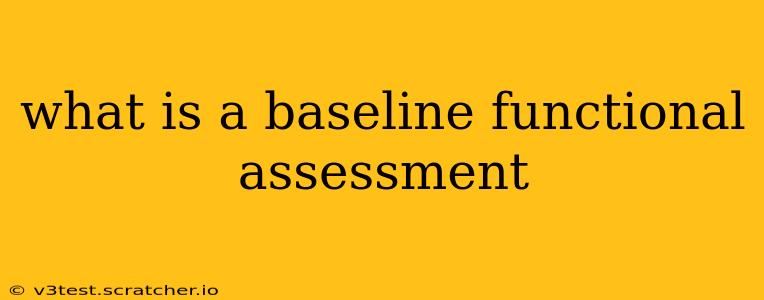A baseline functional assessment is a comprehensive evaluation of an individual's abilities and limitations in performing everyday tasks. It serves as a crucial starting point for understanding their current functional status and developing appropriate interventions or support plans. This assessment isn't a one-size-fits-all approach; it's tailored to the individual's specific needs and context, considering their age, health conditions, and living environment. Think of it as a snapshot of their current capabilities, providing a benchmark against which future progress can be measured.
What does a baseline functional assessment measure?
A baseline functional assessment typically measures a range of activities, broadly categorized into:
-
Activities of Daily Living (ADLs): These are fundamental self-care tasks essential for independent living. Examples include:
- Bathing: Washing oneself completely.
- Dressing: Selecting and putting on clothes.
- Toileting: Using the restroom, including managing bowel and bladder functions.
- Eating: Feeding oneself.
- Transferring: Moving from one surface to another (e.g., bed to chair).
- Continence: Maintaining bladder and bowel control.
-
Instrumental Activities of Daily Living (IADLs): These are more complex tasks that contribute to independent living but aren't strictly necessary for basic survival. Examples include:
- Meal preparation: Planning, cooking, and cleaning up after meals.
- Housekeeping: Cleaning, laundry, and maintaining the home.
- Shopping: Obtaining groceries and other necessities.
- Medication management: Taking medications correctly and on time.
- Transportation: Using public transport, driving, or arranging rides.
- Managing finances: Handling money, paying bills, and managing finances.
- Communication: Using the telephone, email, or other communication methods.
-
Cognitive Function: This assesses mental abilities affecting daily functioning. Examples include:
- Memory: Short-term and long-term memory recall.
- Attention: Ability to focus and concentrate.
- Problem-solving: Ability to identify and solve problems.
- Judgment: Ability to make sound decisions.
- Executive functioning: Planning, organizing, and initiating tasks.
-
Physical Function: This encompasses physical capabilities necessary for daily life. Examples include:
- Strength: Muscle power and endurance.
- Balance: Maintaining equilibrium.
- Range of motion: Flexibility and joint movement.
- Endurance: Ability to sustain physical activity.
- Mobility: Walking, standing, and moving around.
Who conducts a baseline functional assessment?
Depending on the individual's needs and setting, various professionals may conduct a baseline functional assessment. These include:
- Occupational Therapists: Focus on ADLs, IADLs, and adapting the environment to support function.
- Physical Therapists: Focus on physical function, mobility, and strength.
- Registered Nurses: Assess overall health status and functional abilities, often within a hospital or care facility.
- Social Workers: Assess social support systems and community resources.
- Case Managers: Coordinate care and services.
Why is a baseline functional assessment important?
A baseline functional assessment is crucial for several reasons:
- Individualized Care Planning: Provides a foundation for creating a personalized care plan that addresses specific needs and goals.
- Progress Monitoring: Allows for tracking progress over time and making necessary adjustments to the care plan.
- Resource Allocation: Helps determine the type and level of support services needed.
- Goal Setting: Establishes realistic and achievable goals for improving function.
- Discharge Planning: Facilitates a smooth transition to a less restrictive environment.
- Insurance Purposes: Often required by insurance companies to justify the need for certain services.
What happens after a baseline functional assessment?
Following the assessment, a comprehensive report is generated outlining the individual's strengths and weaknesses. This report informs the development of an individualized care plan, which might include:
- Therapy: Occupational, physical, or speech therapy.
- Assistive devices: Adaptive equipment or technology.
- Environmental modifications: Home adaptations to improve safety and accessibility.
- Medication management: Adjustments to medication or medication assistance.
- Support services: Home health aides, caregivers, or other support services.
In conclusion, a baseline functional assessment is a vital tool for evaluating an individual's ability to perform everyday tasks and develop a targeted plan to promote their independence and well-being. It’s a critical starting point for effective intervention and positive outcomes.
